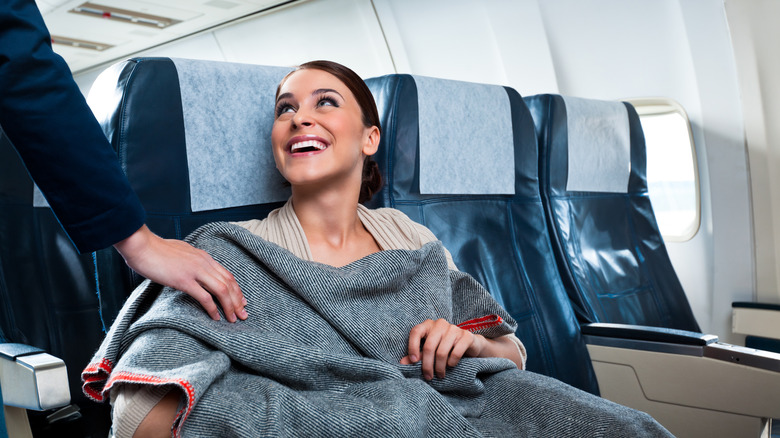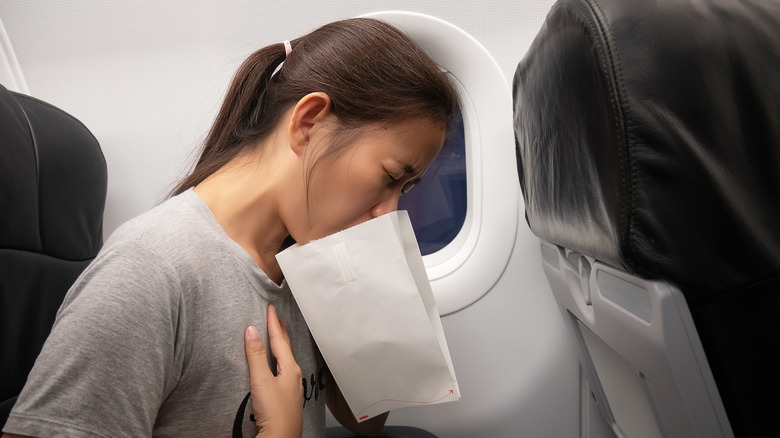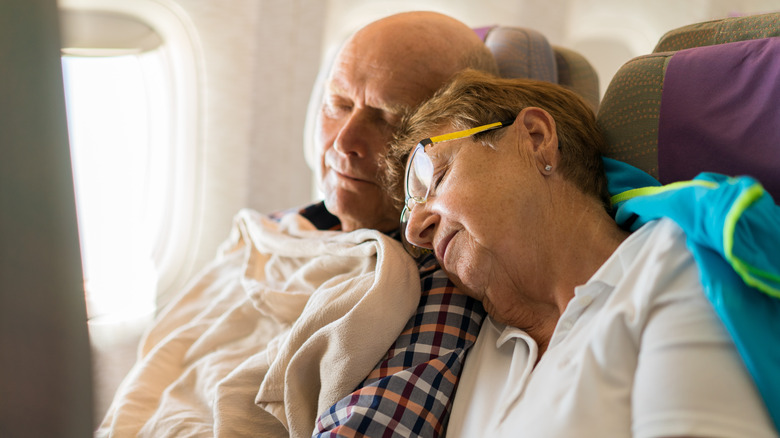The Unexpected Reason Your Plane Is Typically Chilly, According To A Flight Attendant
You're getting prepped for summer vacation in a warm locale. You've packed shorts, lightweight shirts, sandals, and fluttery dresses. You get to the airport and board the plane and boom — you're freezing. Gone are the days of most airlines just giving you a blanket for free on domestic flights, so what can you do? Heck, why is the plane so chilly in the first place? After all, the air in the cabin isn't the same as the air outside anyway. Why can't they turn the heat up?
Flight attendant Vanessa Settimi, who works for Swoop Airlines, told Readers Digest there is a great but unexpected reason you may be shivering on your flight. The air temperature is kept lower on planes because it helps reduce symptoms of motion sickness during turbulence as well has helping to prevent fainting if passengers are prone to it when flying.
That's not all there is to the story. We've got some great tips for you to keep yourself warm during your flight, as well as ideas to help prevent motion sickness and tummy upsets. There is also something you absolutely shouldn't do, even when you're really chilly, according to Settimi. There is some prep involved, so this is important information to have before you take your next flight.
Dealing with motion sickness and what not to do
Don't waste time asking flight attendants to change the temperature. Aside from the fact that there is a good reason for it to be cold, they can't really do anything for you. Settimi said, "Temperature in the cabin is controlled by the pilots, so even though travelers often ask to get the temperature turned up during flights, it is kept on the cooler side."
In a 2008 study by ATSM International (via Readers Digest), it was found that people faint more on planes because of something called hypoxia, which is when you don't get enough oxygen to the tissues in your body. High temperatures are another cause, so keeping the plane cool is important. In addition, cool air can help symptoms of motion sickness calm down.
If you do get a tummy ache on the plane, there are a few things you can do. First, think again before ordering these common beverages on a flight as they can make things much worse. If you're prone to motion sickness, you can take an over the counter remedy like Dramamine to help prevent it. The Centers for Disease Control (CDC) recommends choosing a window seat so you can keep your eyes on the horizon, not drinking alcohol or caffeinated drinks, consuming water and ginger candy, and eating small amounts frequently. You can also sit in this spot to prevent motion sickness during your flight.
What to do if you're chilly on the plane
So, what can you do if you're cold? For starters, travel expert Samantha Brown suggests wearing a scarf, the Swiss army knife of travel clothing. Throw on a hoodie and a scarf which can then be rolled up in your carry-on bag if you don't need them. They can also be shaped into a pillow if your neck is uncomfortable. While you can often purchase a blanket on the plane if you're flying domestically, don't count on the flight attendant having one, just in case. Settimi suggests bringing your own or a sweater.
If you have room in your bag, slippers are a great idea. You can throw them over your socks (which you shouldn't take off on a plane) if you need them. The same goes for a pair of gloves or even a hat if you're the type of person that's always cold. Anything that can do double duty in your luggage helps as well, like the aforementioned hoodie, but if you aren't prepared and you get really chilled, when the seatbelt light is off, grab something from your carry-on to lay over you.
You should also consider ordering a warm beverage from the drink cart or bringing one with you from the airport. It can warm your hands and eventually the rest of your body if you drink it. Finally, the Federal Aviation Administration (FAA) allows you to bring air-activated hand warmers on the plane.


